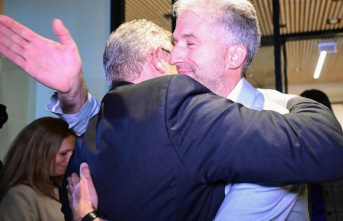The sentencing of the NSU terrorist Beate Zschäpe to the maximum sentence was legal. A constitutional complaint by the 47-year-old was unsuccessful, as the Federal Constitutional Court in Karlsruhe announced on Monday. It was neither stated nor obvious that Zschäpe's basic judicial rights had been violated. A chamber of the Second Senate therefore did not even accept the complaint for decision. (Az. 2 BvR 2222/21)
The "National Socialist Underground" (NSU) had been able to murder through Germany for years without being recognized. The victims: nine traders of Turkish and Greek origin and a German policewoman. The right-wing terrorists also carried out two bomb attacks, injuring dozens of people, and a number of bank robberies.
As the only survivor of the trio, only Zschäpe had to answer in court. Her two friends, Uwe Mundlos and Uwe Böhnhardt, killed themselves in 2011 to avoid arrest.
In July 2018, the Munich Higher Regional Court (OLG) sentenced Zschäpe to life imprisonment as an accomplice after an internationally acclaimed mammoth trial - even if there was never any evidence that she herself was at one of the crime scenes. After more than five years and more than 400 days of trial, the judges also determined the particular gravity of the guilt. This means that early release from prison after 15 years is virtually impossible.
Revision discarded
This judgment has been legally binding for a good year. The Federal Court of Justice (BGH) rejected Zschäpe's revision in August 2021 by written decision - without prior hearing.
Zschäpe had primarily based her constitutional complaint on this point: The Federal Court of Justice surprisingly deviated from its previous case law on complicity, and she was not given an opportunity to say anything about it in court.
However, the constitutional judges do not share these concerns: Zschäpe's defense lawyers had submitted extensive written submissions in the appeal proceedings - the BGH had just not been convinced. Zschäpe's complaint does not reveal what else she would have had to say in a hearing.
The court gives her an important role
The BGH judges had come to the conclusion that Zschäpe's role was mainly to stay in the vicinity of the shared apartment - and that was not comparable to "standing on the dope". But she helped plan all the actions, covered the absence of her accomplices and, as agreed, sent the important confession video after their suicide. "It therefore performed an essential function on which the success of the overall project depended." That justifies the conviction as an accomplice.
In the Munich trial, two co-defendants were also convicted of aiding and two other men as supporters. The judgment is now final in all respects.
Zschäpe's lawyer Mathias Grasel told the "Spiegel" that the decision of the Federal Constitutional Court was "not particularly convincing". Together with Zschäpe's other lawyers, Andreas Lickleder and Wolfgang Heer, he will now examine whether a complaint to the European Court of Human Rights is "useful and promising".
The constitutional judges themselves see themselves in line with the Strasbourg jurisprudence. After that, there must be a negotiation in principle, according to her decision. However, this principle does not apply unrestrictedly to appeal proceedings.
Notification of the court Decision of September 30th "Spiegel" report BGH decision on the hearing complaint of September 22nd, 2021 BGH decision on Zschäpe's revision of August 12th, 2021 Pronouncement (tenor) Second notification (justification) Third notification (sentencing) BGH judgment of December 15, 2021 on André E.












